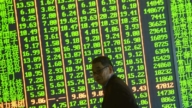【新唐人2013年04月01日讯】大陆各一线城市陆续推出意在打击房产投机的“国五条”实施细则,对购房资格、信贷额度和个人所得税等,进行了严格限制。其中,北京的调控细则号称“史上最严”。但“国五条”是否真的能达到预期效果,各方看法明显不同。
3月30号,北京市政府办公厅对外发布房地产市场调控细则,从限购、信贷和税收三方面进行政策收紧,堪称“史上最严”。细则规定:自3月31号起,成年单身市民在北京市只能购买一套住房。细则还提高了购买第二套房的首付款比例。此外,二手房的个人所得税将高达20%,但对个人转让自用5年以上的家庭唯一用房,继续免征个人所得税。
同一天,上海、重庆也发布了“国五条”实施细则,进一步严格买房者的资格审查、收紧信贷、提高二手房个人所得税。
2月20号,大陆国务院推出“新国五条”,要求各地继续严格执行商品房限购措施、抑制投机、投资性购房。
3月1号,国务院“新国五条”细则出台。其中明确规定,二手房转让将征收20%个人所得税。这一新规使大陆房地产和股市遭遇暴跌。同时,很多人为了规避20%的个人所得税,纷纷赶在各地“国五条”细则正式实施之前,抓紧过户。一时间,一线重点城市的二手房成交量出现井喷状态。
北京《国情内参》首席研究员巩胜利:“以前有些房子多的人现在赶快急着出手,这是一个现象。还有就是,没有房的人,也大量进入市场买卖。这两个现象都在出现。”
现在,随着各地细则的陆续出台并执行,“新国五条”是否能真正抑制投机投资性买房,成为人们关注的热点。大陆网络上,网民对“国五条”细则展开了激烈讨论。
有网友对细则表示支持,认为这一政策能有效遏制炒房投资,稳定房价。
也有网友认为:新规定对于降房价基本起不了多大作用,还是把土地出让金降低,房价自然就会降下来。网友质疑:为什么不对卖土地的征20%的税?
北京《国情内参》期刊首席研究员巩胜利,从市场经济的角度解析大陆房地产市场,认为类似的政府干预方式违背市场经济运行规律,很难起到大的作用。
巩胜利:“市场经济本来就是一种自由经济,那你把这种经济的成分、规律、方向都改变了,全世界都没有出现过这种现象。”
巩胜利指出,大陆房地产市场完全不是市场经济,近年来当局一直在尝试管治房地产市场,但房价仍然越涨越高。
巩胜利:“这样搞下去,中国市场经济、特别是房地产,变成了一个特别的产物,与市场经济所有的规则规律完全背道而行。所以未来的中国房地产市场,可能会出现更麻烦的事情。”
巩胜利举例说,上世纪末期,拉丁美洲国家爆发金融海啸,很多民众都前去银行提款,于是阿根廷等国家就开始限制提款。但这反而促使越来越多的老百姓前来提款。直到后来,在国际援助下,各国不再限制老百姓提款,拉美金融海啸一下子迎刃而解。
对比目前的中国,很多房地产政策都是限制措施,市场面被收缩得越来越窄。因此,“国五条”这类措施最后的结果,很难推断。
采访/刘惠 编辑/李谦 后制/周天
China Releases New Polices to Curb Real Estate
China’s first-tier cities have continued to release local
new regulations on combating speculative house buying.
They impose restrictions on the eligibility of homebuyers,
mortgage loans, and personal income tax on home sales.
Beijing’s rules are labeled as “the most stringent ever”.
Will the official real estate policies deliver the desired
results? Various parties hold significantly different views.
On March 30, Beijing released local
by-laws on the real estate market.
The rule lifts home purchase restrictions, loans and taxes,
which are deemed “the most stringent policy in the history”.
It provides that since March 31, single Beijing
adults are only allowed to buy one house.
The regulation increases the down
payment of the second house loan.
Individual income taxes for second
-hand housing sales rise to 20%.
No personal income tax applies to sales of
houses with over five year of personal usage.
On the same day, Shanghai and Chongqing
published their implementation rules.
Both are further tightening homebuyers
eligibility, loans, as well as raising personal
income tax for second-hand housing sales.
On February 20, China’s State Council released
five policies on real estate market controls.
It urged the expansion of home-purchase restrictions,
and to curb speculative home buying nationwide.
On March 1, the State Council announced
a set of by-laws for 2013 Five Policies.
It stipulates that second-hand housing
sales are subject to an income levy of 20%.
This made the real estate and stock market plummet.
Lots of property owners have rushed to
complete sales before the by-laws go into effect.
Thus, second-hand housing sales have
suddenly soared in China’s first-tier cities.
Gong Shengli, Chief Researcher at China Realities
Insight Journal: “Multiple house owners are now rushing to sell their properties.
Meanwhile, those without houses
have entered the market enormously.”
Provincial by-laws have continued to be released.
Whether these new policies can successfully
curb speculative house buying or not,
has now become the attention of public focus.
The issue has sparked a heated
debate among netizens in China.
Netizens in support believe that the policy will effectively
limit speculative house buying, and stabilize house prices.
A netizen posted, “The new policies
precisely target real estate speculators.
If they continue to stock houses,
they’ll face paying property taxes.
As most ordinary citizens only have one house,
they’re exempt from 20% income tax on house sales.
So the new policies won’t affect
ordinary citizens’ home buying.”
Another netizen said, “the new policies won’t
make a difference in lowering housing prices.
Housing prices will naturally
fall with reducing land-use fees.
Some netizens asked, “Why aren’t
land sales levied with the 20% tax?”
Gong Shengli says that such government
interventions are contrary to market rules.
He thinks the official policies will hardly play a big role.
Gong Shengli: “The market
economy shall be a free economy.
Now in China, they have changed the
economic elements, rules, and direction.
This has never appeared in other countries.”
Gong Shengli adds that China’s real estate
market is certainly not a market economy.
In recent years, the authorities have tried to curb the
property market, but housing prices continue to rise.
Gong Shengli: “If this continues, China’s economy,
especially the property market, will turn into a strange thing.
It will be against all market rules.
So in the near future, China’s real estate
market will face more and bigger troubles.”
Gong Shengli gave an example of the financial
crisis in Latin America in the late of 20th century.
Lots of people withdrew their money from banks.
Then, Argentina and some other countries began to
limit withdrawals, but this lead to more cash withdrawals.
Later, bank withdrawals were no longer limited
worldwide, and the financial crisis was easily solved.
By contrast, China’s many existing
policies on real estate are all restrictions.
This made the market continue to narrow.
It is hard to forecast the result from
the implementation of the new polices.



























